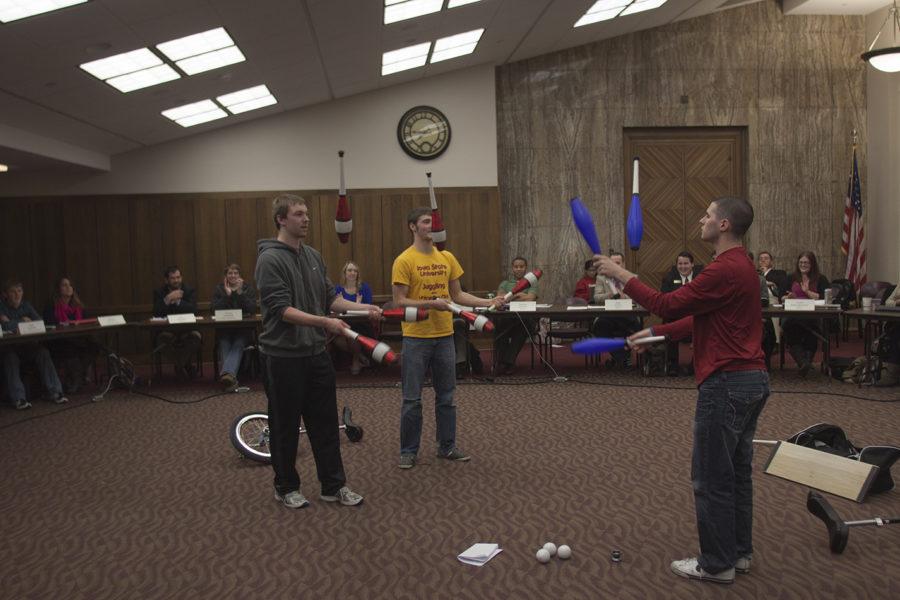GSB revises election code, approves funding for international mentoring program
Photo: Yanhua Huang/ Iowa State Daily
Matthew Weaver, sophomore in mechanical engineering, left, James Moran, junior in materials engineering, and Brandon Stodghill, junior in industrial engineering, show off their skills during the Government of the Student Body meeting Wednesday, Nov. 14, in the Cardinal Room of the Memorial Union.
November 15, 2012
The Government of the Student Body passed three bills Wednesday, Nov. 14: “Funding International Mentoring,” “Election Code Revisions” and “Funding Food for Town Hall.”
The “Funding International Mentoring” was proposed by Nyajuok Deng, GSB director of diversity, and the International Student and Scholars Office, asking $1,380 be allocated so the office could form an international student mentoring program. $1,160 of the funds would be used to pay a student worker to oversee the program for 160 hours, $170 for training material and $50 for promotional materials.
The group plans to have 20 student mentors work with new international students to help them through the college transition and help them adjust to the cultural differences.
“The college transition is hard as it is for all of us, but is even harder for international students,” Deng said.
This part of the bill was passed by a vote of 22-2.
The GSB representatives, however, voted down the next part of the bill, “International Student Mentoring Program Bylaw,” which took the principles of the “Funding International Mentoring” and turned them into a bylaw making it a GSB-funded office like Student Legal Services.
“Election Code Revisions” brings about changes in the election and campaigning process. The revisions lowered the number of signatures required for people running for the executive position, banned the chalking of university buildings and building staircases, banned active campaigning while the polls are open and banned collecting student signatures during a class.
The ban on obtaining signatures during class brought about the most conversation and debate; the senate eventually removed this part and made it its own bill to vote on apart from the original bill; this separate bill banning the collection of signatures during class was passed.
“We feel that [signatures] have a purpose, and we feel that just passing them around lecture halls does not fulfill that purpose,” said Adam Guenther, election commissioner for GSB.
Some senators debated that by passing around the signature sheet, they grew awareness for GSB and that they had to give a small speech to the class about GSB prior to passing the sheets around.
Guenther also said there would be an informational meeting at 6 p.m. Nov. 28 in the Cardinal Room of the Memorial Union for people interested in running for a spot in GSB.
“Funding Food for Town Hall Meeting” was waived of its first read and was voted on. The bill proposed that $308.10 plus an 18 percent service charge be allocated for GSB’s planned town hall meeting Dec. 5. The meeting is to have university officials and city government officials in attendance along with GSB members.
The problem with this bill, as some senators pointed out, was GSB does not fund food unless it is international cuisine and that it would be “hypocritical” of them to treat this as a special circumstance.
“We need to be consistent with what we do,” said GSB Sen. Melinda Busch, who went on to say that she didn’t believe food was necessary to facilitate the meeting.
Other senators believed this was a special case because there would be guests in attendance, it would be an open event to students and it would reflect well on the organization.
The bill passed by a vote of 19-5-1.










